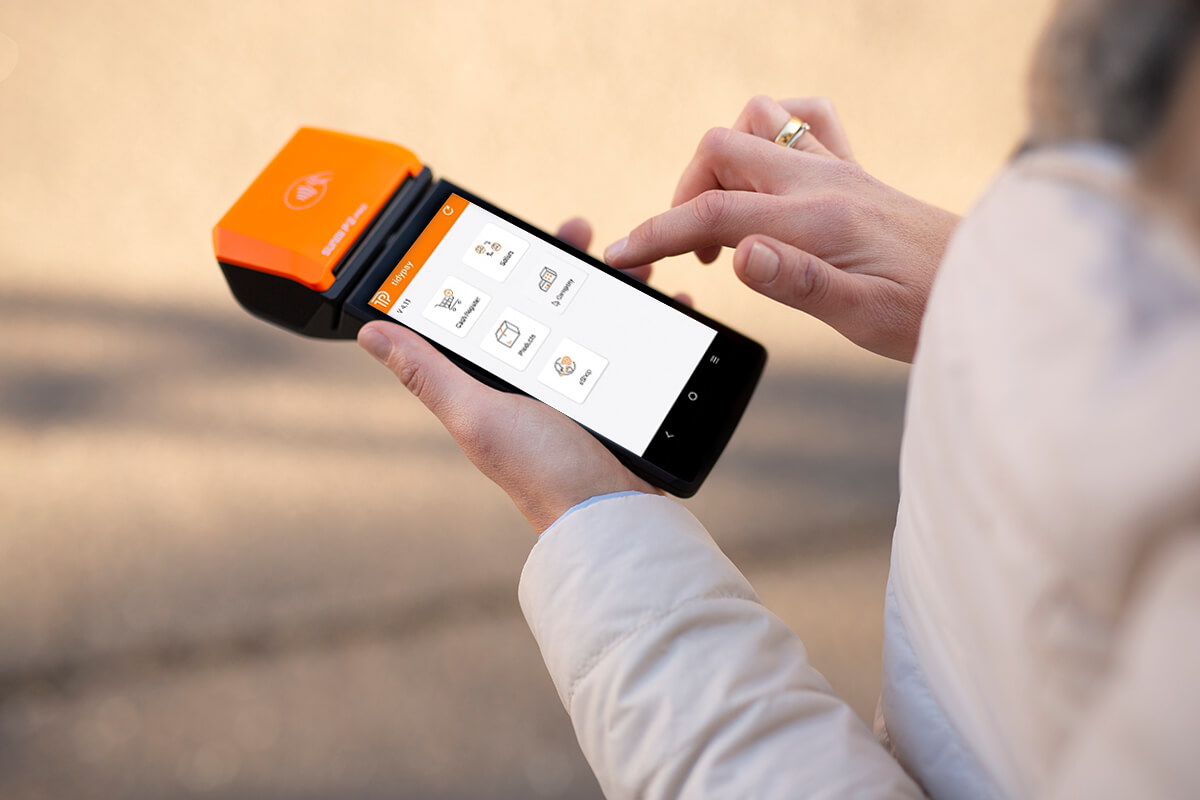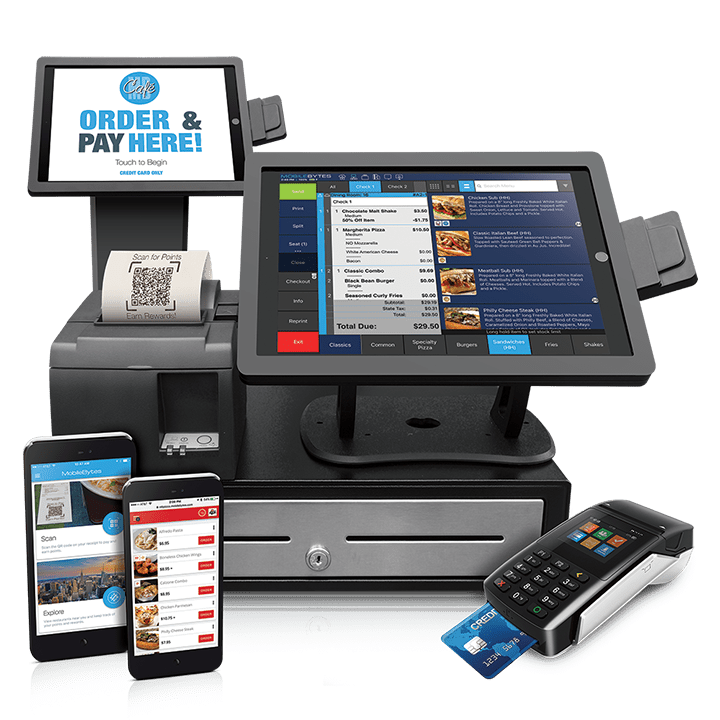Get This Report about Pos Machine

Restaurant POS: Retail Point-Of-Sale Solutions Streamline Transactions
Point Of Sale Software for Beginners

Hardware Components of a Point of Sale System What makes a POS system tick? It's not simply software; the hardware plays a starring role. Think of it as the body to the software application's brain. Without the right hardware, even the most advanced POS software application is just a quite face. Vital POS Hardware So, what are the must-haves? Let's break it down. The main processing system, often a computer system or tablet, is the heart of the operation. The monitor or touchscreen display permits staff to communicate with the system. A barcode scanner accelerate the checkout process. Remember the days of by hand getting in each code? The trusty receipt printer offers customers with a record of their purchase. A cash drawer keeps your money safe and organized. A card reader enables clients to pay with credit or debit cards. Diving Deeper: Beyond the Fundamentals However wait, there's more! Depending upon your company, you may require specialized hardware. A dining establishment might include kitchen check here area printers to relay orders, while a retail shop may use label printers for item tagging. Ever wonder how your local pastry shop immediately prints those delicious-looking labels? Choosing the Right Hardware: A Balancing Act Choosing the right hardware isn't just about buying the most pricey equipment. It's about finding the sweet spot between performance, sturdiness, and budget. A little service simply beginning might select a more basic setup, while a high-volume seller will require robust, high-performance devices. Is it much better to purchase brand-new or used? Consider your choices carefully. A new system offers the most recent technology and warranty defense, but a refurbished system can save you cash. The Future of POS Hardware What does the future hold? Anticipate to see even more combination with mobile gadgets, biometric scanners for employee authentication, and advanced analytics dashboards displayed on bigger, clearer screens. Think of a world where stock is instantly updated in real-time as items are scanned-- a world where you can track your very popular item from anywhere in the world. The possibilities are limitless, and the hardware is constantly progressing to satisfy the demands of today's businesses. Are you ready to update your point of sale system?
Software Features and Capabilities: The Heart of Your POS System
Ever enjoy an experienced barista glide through a busy early morning rush? Their trick isn't just caffeine; it's a seamless dance with their POS system. The software application is the conductor of your service symphony, orchestrating everything from sales to stock. However what notes should you be listening for? What abilities genuinely matter in today's market?
Stock Management: Beyond Counting Beans
Forget spreadsheets that haunt your dreams. Modern POS systems offer real-time stock tracking, signaling you when your stock of artisanal coffee beans dips precariously low. Consider it as a digital guardian angel, avoiding those awkward "Sorry, we're out!" minutes to consumers. What if you could also forecast need based upon historic information? Lots of systems now use forecasting tools, a powerful weapon against overstocking and lost sales. This helps prevent the circumstance of lacking popular products or building up excess stock of slow-moving products, both of which can constrain capital and space.
Sales Reporting and Analytics: Decoding the Information
Sales information is the new gold, and your POS system is the miner. Forget feeling in one's bones how much you sold today. Dive deep into the information to discover trends, identify your very popular products, and understand client behavior. Which menu item pairs perfectly with the everyday special? Which promo resonated most with your customers? These insights are not simply interesting; they're actionable intelligence. Without reliable sales reporting, browsing the intricacies of organization decision-making becomes like sailing without a compass, increasing the possibility of bad moves and missed chances.
Consumer Relationship Management (CRM): Structure Bridges, Not Walls
Keeping in mind a regular consumer's name and preferred order is lovely, but scaling that personal touch is challenging. POS systems with CRM abilities allow you to track customer purchase history, preferences, and even birthdays. Picture instantly providing a discount on their birthday-- a small gesture that fosters loyalty and motivates repeat service. But there is the prospective snag of bad information quality, which can cause inaccurate consumer profiles and inadequate marketing efforts.
Payment Processing: Improving the Transaction
The checkout experience can make or break a sale. Seamless combination with numerous payment approaches-- credit cards, mobile wallets, even copyright-- is non-negotiable. Can your system handle split payments? Does it use secure tokenization to secure consumer data? A cumbersome payment process is like striking a sour note in your company symphony, possibly interrupting the entire performance. Making sure compatibility with developing payment technologies and adherence to security standards are critical for preserving consumer trust and functional efficiency.
Staff Member Management: Keeping the Group in Sync
From clocking in and out to handling permissions and tracking performance, employee management features improve operations and improve accountability. Is scheduling a problem? Lots of POS systems offer integrated scheduling tools, enhancing staffing levels based on forecasted need. A common obstacle that is typically overlooked is the challenge of incorporating employee management functionalities with payroll systems, which can cause errors and inadequacies in wage estimations.
Advanced Features: Leveling Up Your Operations
- Table Management: Ideal for restaurants, this function enables you to visualize your dining space, track table status, and manage appointments.
- Commitment Programs: Reward your finest consumers and encourage repeat service with incorporated commitment programs.
- Online Buying Integration: Seamlessly incorporate your POS system with online buying platforms to broaden your reach.
Choosing the best POS system is about more than simply functionality; it's about discovering a partner that can grow with your organization. Consider your existing requirements, expect future growth, and don't be scared to ask the hard concerns. The best software application can change your organization from a chaotic cacophony into an unified masterpiece.
Industry-Specific POS System Applications
Think of the local pastry shop, busy with morning consumers craving fresh croissants. A generic POS system might handle deals, but can it handle intricate dishes, track active ingredient stock, or immediately change production schedules based upon sales data? Most likely not. That is where the appeal of industry-specific POS systems shines.
Restaurants and Hospitality
For dynamic dining establishments, speed and precision are critical. The number of times have you seen servers managing orders, adjustments, and splitting expenses, all while attempting to offer outstanding service? A restaurant POS system enhances these processes, enabling table management, cooking area order tickets, and even online purchasing combination. These systems typically include features like ingredient-level inventory tracking, important for managing food expenses and lessening waste. Ever wonder why your preferred dish is often unavailable? It may originate from a lack of appropriate inventory management.
- Table Management
- Cooking Area Order Tickets
- Online Ordering Combination
- Ingredient-Level Stock Tracking
Retail Solutions
Retail, with its diverse stock and customer interactions, requires a various set of tools. Envision a shop clothing store having a hard time to keep an eye on sizes, colors, and seasonal collections utilizing a basic checkout system. An industry-specific retail POS system provides features like barcode scanning, client commitment programs, and comprehensive sales reporting. These systems can even integrate with e-commerce platforms, offering a seamless omnichannel experience for clients. Did you understand some retail POS systems can anticipate future sales trends based upon historic data? Now that is effective!
The Perils of a Mismatch
Choosing the incorrect POS system can develop considerable operational obstacles. A clothes shop using a restaurant POS, for instance, would find it inappropriate for managing inventory with sizes and colors. The absence of appropriate reporting and analytics could lead to misinformed buying choices and lost earnings. The outcome might be comparable to attempting to fit a square peg in a round hole.
Secret Factors to consider
Selecting an industry-specific POS system needs cautious examination. Believe about your service's special needs and functional workflows. Does the system incorporate with existing software? Does it provide the essential reporting capabilities? Is it scalable to accommodate future growth? A well-chosen POS system is not simply a deal tool; it's a tactical property that can drive performance, enhance client satisfaction, and eventually, increase your bottom line. Remember, it is an investment in your company's future, not just a cost.
Security Considerations for Point of Sale Systems
Ever heard the tale of the mom-and-pop store that lost whatever due to the fact that of a single, overlooked security flaw in their POS system!.?. !? It's a cautionary tale, and it highlights a crucial aspect frequently overshadowed by the allure of expensive functions and streamlined operations. The truth is, a POS system is only as great as its security. What good is a system that crunches numbers in a flash if it allows wrongdoers to swipe customer's information just as quickly?
The Vulnerability Minefield
The digital landscape is a battlefield. Every POS system, despite size or sophistication, is a potential target. Are you genuinely prepared for the risks lurking around the corner? The genuine pinch comes when you find that your outdated software has an open hole that hackers can make use of, turning your organization into an unwitting accomplice in identity theft. The difficulty is that hackers are crafty and are constantly altering their strategies.
Typical Security Spaces and Expert Tips
- Weak Passwords: "Password123" isn't sufficing. Use strong, distinct passwords for all POS system accounts and alter them regularly. Two-factor authentication is a must.
- Unsecured Networks: Your Wi-Fi is like leaving the front door open. Protect your network with strong encryption (WPA3 if possible) and think about a different network for your POS system.
- Outdated Software Application: Software vendors spot security holes all the time. Failing to upgrade is like inviting difficulty. Set up automated updates or schedule routine upkeep.
- Employee Training: Your staff is your very first line of defense. Train them to recognize phishing attempts, secure passwords, and report suspicious activity.
Data File Encryption: Your Guard Against the Dark Arts
Consider data file encryption as a secret code. It scrambles delicate details, like credit card numbers, making it unreadable to unauthorized users. Without encryption, your customers' monetary information resemble sitting ducks, ripe for the picking by cybercriminals. It's not almost safeguarding your consumers; it's about securing your reputation and preventing large fines.
PCI Compliance: The Rulebook You Can't Ignore
If you accept charge card, you're bound by the Payment Card Market Data Security Standard (PCI DSS) It's a set of security requirements developed to secure cardholder data. Failing to comply can lead to fines, charges, and even the loss of your capability to process charge card payments. It's a headache, yes, but it's an essential one. Believe of PCI compliance as the cost of doing service in the digital age.
Consider this: every deal processed through your point of sale is a prospective entry point for malicious stars. By carrying out robust security steps, you're not simply safeguarding your company; you're protecting your clients' trust and making sure the long-lasting practicality of your operations. The security of your POS system isn't just a technical concern; it's an organization essential. It requires constant caution, proactive procedures, and a dedication to remaining ahead of the curve.